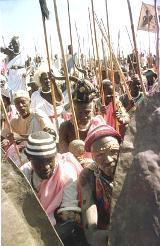Anger among Sudan’s southerners could hamper peace deal’s success
KHARTOUM, Jan 7 (AFP) — Building confidence between northern and southern Sudanese will be crucial to the success of a long-awaited peace deal, and analysts fear this could be a monumental task after two decades of hostilities.

|
|
Southern Sudanese welcome president el Bashir in Malakal, January 13, 2003. |
The Sudanese government and the Sudan People’s Liberation Movement (SPLM) will sign a peace agreement Sunday to end Africa’s longest-running conflict in southern Sudan, in a grand ceremony in the Kenyan capital Nairobi.
As a first step, the government will have to withdraw its military from much of the south, with the predominantly southern SPLM’s forces replacing them and taking over policing and other duties in the region.
The rebel troops, along with tribal militias which the government recruited to fight the SPLM, are blamed for carrying out abuses in the south during the 21-year war that has claimed at least 1.5 million lives and displaced some four million people.
“The memory of the actions of these militia against the civilian population threatens to set off a vendetta in this region,” said Osman Marghani, a professor at the University of Khartoum and an affiliate of the Cairo-based Arab Centre for Strategic Studies.
He expressed fear that many northern Muslim traders and civil servants who moved to the south over the years could be tragetted by southerners who accuse them pf complicity in atrocities against people in the south.
Hundreds of southerners disappeared during the turbulent years of war, more were shocked into fleeing after their meagre property was confiscated and there were reports of rape and abductions, including by traders.
The United Nations hopes to offset some of these concerns by deploying more than 10,000 troops in southern and central Sudan to maintain peace, help boost confidence and assure individuals about their security.
It also has plans to move its southern Sudan offices from Nairobi to Rumbek, the seat of the SPLM, believing this will help it to better follow developments in the region.
Under the provisions of the peace deal, militia groups, a few of which split from the SPLM and accepted a government offer for arms in exchange for a pledge to fight the SPLM, will have up to a year to accept integration into the regular Sudanese army or join the SPLA, the SPLM’s armed wing.
“There will not be any militias or armed forces existing in the south other than the government, SPLA and the joint forces,” Nafie Ali Nafie, deputy secretary general of the ruling National Congress party said Thursday.
“All factions and militias have to join either the government army or SPLA ranks,” he added, quoted by the official Sudan News Agency.
These groups, many of them established along tribal lines, also fought other tribes, mainly to settle old scores, and added a new ethnic dimension to the conflict.
UN special envoy to Sudan, Jan Pronk, seemed to agree that such actions could set off an unending circle of ethnic wars when he identified three challenges that could derail the march towards peace.
He suggested that the militia groups and other armed individuals roaming the south be disarmed, unless they agree to be integrated into either the SPLM or regular government forces.
He stressed the need to adopt a comprehensive plan for the reintegration of former combatants into civilian life, which would include training them for civlian duties and giving them help to make a fresh beginning.
And Pronk also highlighted problems encountered by the estimated four million southern Sudanese displaced by the war may upon returning to their homes in a region the size of France and Italy combined.
Sudanese First Vice President Ali Osman Taha, Khartoum’s chief negotiator in talks with the SPLM, agreed that the Sudanese people face an uphill battle as they go about rebuilding their lives and the country.
“The first stage is the most difficult; the road ahead is not paved with roses,” he commented.
